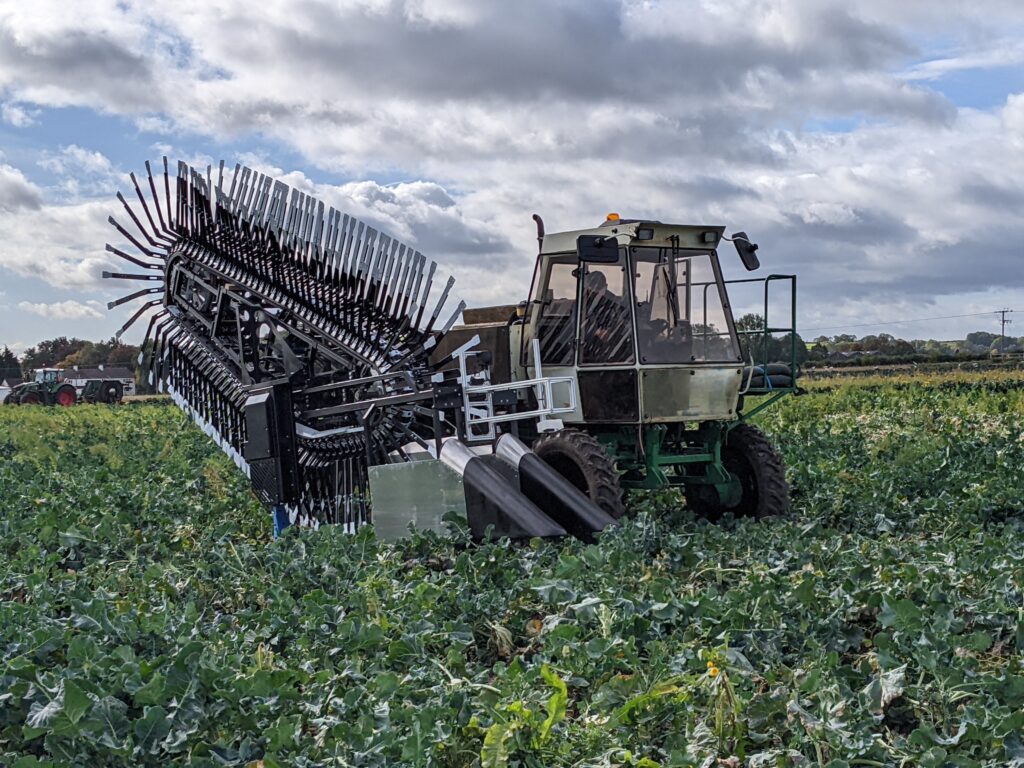UPP, the harvesting technology and broccoli proteininnovator has led a consortium of AgriFoodTech researchers and engineers, including the James Hutton Institute and Agri-EPI Centre, in winning a joint grant from the Department of Food and Rural Affairs (DEFRA) and UK Research and Innovation (UKRI). The new SusProt Project will focus on utilising the 80% of unharvested broccoli biomass (stem and stalk) to create low-cost, low-impact, highly nutritious protein from this previously wasted side stream.

Boston Consulting Group (BCG) recently estimated that the food system currently accounts for 26% of global CO2 emissions and concluded that switching to alternative, plant-based proteins is one of the most impactful ways to combat the climate crisis. The United Nations has also argued that food loss and waste accounts for nearly 8% of global greenhouse gas emissions and that reducing waste close to the farm, as targeted by this project, is the most effective way of addressing food insecurity and alleviating street on land and water.
If, by 2035, 11% of all protein consumed globally were substituted for plant-based alternatives, BCG analysis concludes that more than 1 gigaton of CO2e would be saved, the equivalent to decarbonising 95% of the aviation industry. The SusProt project is therefore targeting two of the biggest challenges in agriculture – reducing wastage and decarbonising protein supply.
DEFRA figures suggest that in the UK alone, more than 600,000 tonnes of broccoli plant mass is currently wasted, this includes not only the stem, stalk and leaves, but also broccoli heads that do not meet strict supermarket specifications. This ‘waste’ side stream is just as nutritious as the broccoli in the supermarket and can be harvested for valuable proteins and ingredients as a more sustainable alternative to pea or soya protein.

The UPP led consortium includes the world-renowned James Hutton Institute, often referred to as the MIT of AgriTech, whichbrings expertise in crop valorisation, phyto-chemistry, food and nutrition. Precision agriculture specialists, Agri-EPI Centre will provide life cycle analysis, measuring exactly how environmentally and economically sustainable the product is at each stage of its development, informing the best adaptations to maximise e.g. water and energy-use and minimise emissions, and will provide an evidence base to the environmental benefits.
The project will end in December next year and will also evaluate the potential to extend to other unused primary crops. The SusProt consortium is working with leading food companies Samworth Brothers, Innocent Drinks and Lees of Scotland, who will test and evaluate the proteins and other extracts for use in their products.
“Protein is an essential nutrient in our diet. Climate change and its associated impacts on our current and future quality of life mean that we need to reconsider our sources of protein and how they are produced. Through this consortium, we believe we are developing a step-change in protein production”
Professor Derek Stewart, Director of the Advanced Plant Growth Centre
David Whitewood, UPP co-founder and CEO, commented:
“We’re delighted to have won this grant and to be working with some of the UK’s best AgriFoodTech teams to deliver this project. The global demand for plant proteins is growing significantly, driven by a strong consumer demand for healthier nutrition and sustainable food. Broccoli ‘waste’ is just as nutritious and healthy as the broccoli heads we buy at the supermarket, this project aims to ensure that broccoli is no longer ‘growing to waste’.”
Commenting on Innocent’s potential use of broccoli protein in future project ranges, Robin Slatter, Scouting and R&D lead for Innocent Drinks, said:
“We are always searching for new ways to make it easy for people to eat more fruit and veg whilst looking after the planet. We are excited to see, through this project, how broccoli stem, which otherwise would be wasted, can be used to create a healthy and nutritious product that is better for people and better for the planet.”
This award follows a £500,000 initial investment from Elbow Beach Capital in UPP in January 2023. The company aims to raise an additional £3m though a seed investment round expected to close in early 2024. UPP aims to be generating first revenues in 2024, growing to more than £50 million in revenue in its three pilot markets in 2027.
Professor Derek Stewart will join the advisory board of UPP as Scientific Advisor with immediate effect joining Andy Summerfield, Investment Director of Elbow Beach Capital.
For enquiries or more information regarding The James Hutton Institute, please contact Joel Meekison at Joel@clarkcommunications.co.ukor 07411482505
About the APGC and IBH: The new combined facility will embody the idea of Agriculture 4.0, a green revolution with science and technology at its heart, and the aim of feeding future populations. It will also boost the impact of the UK’s International Development agenda.
The Advanced Plant Growth Centre will take advantage of technological advances in controlled environment growth and post-harvest storage systems to support, de-risk and develop the entire food and drink sector. The International Barley Hub is set to translate scientific research into tangible impacts for all barley-related industries in the breeding, farming, malting, brewing, feed, food and health sectors. The International Barley Hub (IBH) will promote scientific discovery and innovation to tackle these issues, as well as pilot new technologies for crop management, such as precision agriculture sensors and drones.
About UPP: Upcycled Plant Power (UPP) was founded in 2022 by David Whitewood, Martin Stace and leading organic farmer Pollybell Farms. upp has developed unique broccoli harvest technology which supplies its complementary upcycled plant-based proteins and ingredients business. UPP’s vision is to reduce vegetable crop waste by automating harvests and producing clean, natural, healthy proteins and ingredients from what we already grow. UPP received £500k in funding from Elbow Beach Capital in January 2023 and is in the process of raising a £3 million round to further develop its technology. Learn more: www.upp.farm

